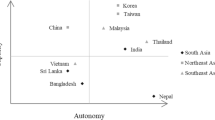Abstract
This paper aims at looking at governance instruments beyond managerial technicality. It intends to do so by analysing the impact of governance reforms on the universities autonomy assumed as a regulation instrument to politically steer systems and institutions. The regulation efforts undertaken at the European and national levels reflect a trend towards coordination of devolved governance processes (meta-governance). Although there is a wide consensus about awarding autonomy to universities and increasing self-governance, governments need to ensure that their goals are actually pursued, enhancing their regulation frames and meta-governance efforts. This paper focuses on how the governance reform interacts with institutional contexts. The changes promoted by the governance reform are an opportunity to understand how far these apparently contradictory forces operate in three selected Portuguese universities with regard to institutional autonomy.
Similar content being viewed by others
References
Amaral, A. and Magalhães, A. (2001) ‘On markets, autonomy and regulation the janus head revisited’, Higher Education Policy 14 (1): 7–20.
Amaral, A., Tavares, O. and Santos, C. (2011) ‘Higher Education Reform in Portugal: An Historical and Comparative Perspective of the New Legal Framework for Public Universities’, Paper presented at the Third International RESUP Conference; 28 January, Paris, France.
Bache, I. (2008) Europeanization and Multilevel Governance — Cohesion Policy in the EU and Britain, London: Blackwell Publishing.
Baldwin, R. and Cave, M. (1999) Understanding Regulation, Oxford: Oxford Universtiy Press.
Brunsson, N. and Sahlin-Andersen, K. (2000) ‘Constructing organizations: The example of public sector reform’, Organization Studies 21 (4): 721–746.
CHEPS. (2007) ‘The extent and impact of higher education governance reform across Europe — Final report to the Directorate-General for Education and Culture of the European Commission (Vol. 1)’, Enschede.
Chubb, J. and Moe, T. (1990) Politics, Markets and America's Schools, Washington: The Brookings Institution.
Dale, R. (2007a) ‘Globalization and the Rescaling of Educational Governance: A Case of Sociological Ectopia’, in C.A. Torres and A. Teodoro (eds.) Critique and Utopia: New Developments in the Sociology of Education in the Twenty-First Century, New York: Rowman & Littlefield Publishers Inc, pp. 25–42.
Dale, R. (2007b) ‘Repairing the Deficits of Modernity — The Emergence of Parallel Discourses in Higher Education in Europe’, in D. Epstein, R. Boden, R. Deem, F. Rizvi and S. Wright (eds.) World Yearbook of Education 2008, London: Routledge, pp. 14–31.
European Commission. (2001) European Governance — A White Paper, Brussels: European Commission.
Hall, P.A. and Taylor, R.C.R. (1996) ‘Political science and the three new institutionalisms’, Political Studies 44: 936–957.
Hooghe, L. and Marks, G. (2001) Multi-Level Governance and European Integration, Maryland: Rowman & Littlefield Publishers, Inc.
Hughes, O. (2010) ‘Does Governance Exist?’, in S. Osborne (ed.) The New Public Governance? Emerging Perspectives on the Theory and Practice of Public Governance, London: Routledge, pp. 87–104.
Kennett, P. (2010) ‘Global Perspectives on Governance’, in S. Osborne (ed.) The New Public Governance: Emerging Perspectives on the Theory and Practice of Public Governance, London: Routledge, pp. 19–35.
Kjaer, A. (2010) Governance, Cambridge: Polity.
Kjaer, P. (2010) Between Governing and Governance: On the Emergence, Function and Form of Europe's Post-national Constellation, Oxford: Hart Publishing.
Lodge, M. (2003) ‘Institutional choice and policy transfer: Reforming British and German railway regulation’, Governance 16 (2): 159–178.
Magalhães, A. and Amaral, A. (2000) ‘Portuguese higher education and the imaginary friend: The stakeholders role in institutional governance’, European Journal of Education 35 (4): 437–446.
Magalhães, A., Veiga, A., Ribeiro, F.M., Sousa, S. and Santiago, R. (2012) ‘Creating a common grammar for European higher education governance’, Higher Education, DOI: 10.1007/s10734-012-9583-7, pp. 1–18.
Magalhães, A.M. (2004) A Identidade do Ensino Superior — política, conhecimento e educação numa época de transição, Lisbon: Fundação Calouste Gulbenkian/Fundação para a Ciência e Tecnologia.
Meek, V.L. (2003) ‘Introduction’, in A. Amaral, V.L. Meek and I.M. Larsen (eds.) The Higher Education Managerial Revolution?, Dordrecht: Kluwers Academic Publishers, pp. 1–29.
Moreira, V. (2008) ‘O Estatuto Legal das Instituições de Ensino Superior’, in A. Amaral (ed.) Políticas de Ensino Superior – quatro temas em debate, Lisbon: Conselho Nacional de Educação, pp. 123–139.
Neave, G. (2008) ‘From Guardian to Overseer: Trends in Institutional Autonomy, Governance and Leadership’, in A. Amaral (ed.) Reforma do Ensino Superior: Quatro Temas em Debate, Lisboa: Conselho Nacional de Educação.
Neave, G. (2012) The Prince and His Pleasure Institutional Autonomy, the Evaluative State and Re-engineering Higher Education in Western Europe, Basingstoke: Palgrave.
OECD. (1995) Participatory Development and Good Governance, Paris: OECD.
Osborne, S. (2010) The New Public Governance: Emerging Perspectives on the Theory and Practice of Public Governance, London: Routledge.
Peters, G. (2001) The Future of Governing, Lawrence: University Press of Kansas.
Peters, G. (2010) ‘Meta-Governance and Public Management’, in S. Osborne (ed.) The New Public Governance? Emerging Perspectives on the Theory and Practice of Public Governance, London: Routledge, pp. 87–104.
Pierre, P. and Peters, G. (2000) Governance, Politics and the State, New York: St. Martin's Press.
Pollit, C. and Bouckaert, G. (2004) Public Management Reform: A Comparative Analysis, Oxford: Oxford University Press.
Rhodes, R.A.W. (1996) ‘The new governance: Governing without Government’, Political Studies 44: 652–667.
Rizvi, F. and Lingard, B. (2010) Globalizing Education Policy, London: Routledge.
Rosenau, J. and Czempiel, E. (2000) Governance Without Government: Order and Change in World Politics, Cambridge: Cambridge University Press.
Salamon, L. (2002) ‘The New Governance and the Tools of Public Action: An Introduction’, in L. Salamon (ed.) The Tools of Government: A Guide to the New Governance, Oxford: Oxford University Press.
Santiago, R., Magalhães, A. and Carvalho, T. (2005) O surgimento do Managerialismo no sistema de Ensino Superior Português, Masotinhos: CIPES.
Scott, P. (1995) The Meanings of Mass Higher Education, London: The Society for Research into Higher Education.
UniA. (2009) ‘Self-Evaluation Report’.
UniA. (2010) ‘Evaluation Report’, European University Association, Institutional Evaluation Programme.
UniB. (2007a) ‘Evaluation Report’, European University Association, Institutional Evaluation Programme.
UniB. (2007b) ‘Self-Evaluation Report’.
UniC. (2009) ‘Evaluation Report’, European University Association, Institutional Evaluation Programme.
World Bank. (1992) Governance and Development, Washington DC: World Bank.
Acknowledgements
This research was funded by National Funds through the support of FCT — Fundação para a Ciência e a Tecnologia under the framework of the EuroHESC/0001/2008 project.
Author information
Authors and Affiliations
Rights and permissions
About this article
Cite this article
Magalhães, A., Veiga, A., Ribeiro, F. et al. Governance and Institutional Autonomy: Governing and Governance in Portuguese Higher Education. High Educ Policy 26, 243–262 (2013). https://doi.org/10.1057/hep.2012.31
Published:
Issue Date:
DOI: https://doi.org/10.1057/hep.2012.31




